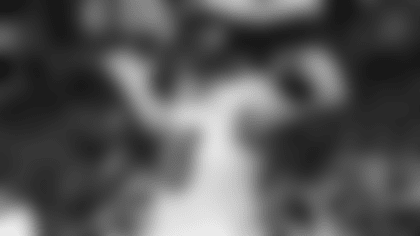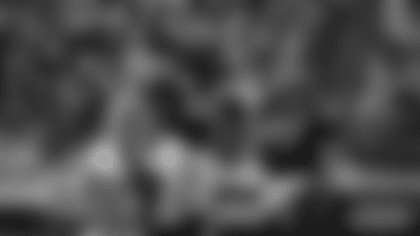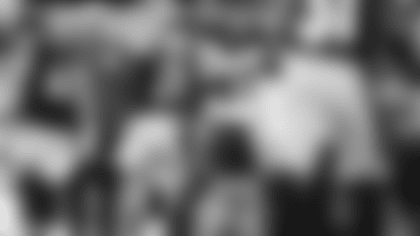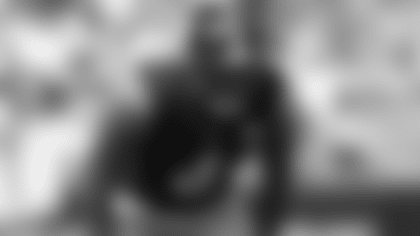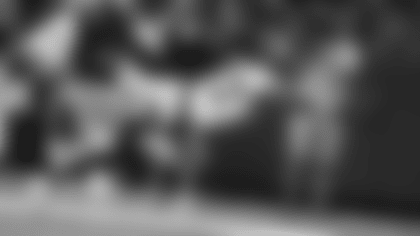Q. You often refer to a process you call, "combing through the video," which refers to watching and grading a performance. When you comb through the video, do you watch it as a game would be televised – one play after another in chronological order? Do you watch each play 11 times to focus on each player and his assignment? What's your process?
A. I watch the game multiple ways. First, I watch it by phase. I watch all the offensive snaps in succession. I watch the special team snaps in succession, the defensive snaps in succession, and during that time that's where I'll run the play back, if you will, looking at individual techniques relative to positions and quality of play and of men. And so, I watch it that way and then, when all that's done and noted, I'll go back and watch what I call "full game." That's the game in succession, where you see the twists and turns, and you watch the units respond to the ebb and flow of the game. How does the offense do when it gets a turnover and is presented the ball on the short field? How does the defense perform when it has to defend a turnover and is put on a short field? How does the kicking game accentuate play? Are we flipping the field in our punting game, etc. There are many lessons to be learned and taught off the tape, so that's why I watch it differently. When I'm watching that full game, I'm teaching football awareness and just overall knowledge of the game, and so we talk in those ways when we're analyzing it from a full game standpoint. And when we're just looking at the phases themselves, that's when we're looking at our techniques and the quality of work relative to our assignments and things of that nature.
Q. For example, if you notice an offensive lineman is having a rough night while watching the video, do you watch to determine that it's his footwork, or it's his hand placement, or do you just leave that for his position coach?
A. I think we're all looking at it in that way. I watch the video independently and gain independent thought relative to some of those circumstances, and then I meet with parts of the staff, and we discuss the game and the men, and I'm always interested in seeing if their perspective mirrors mine or differs with mine. I value opinions in the process. If we're all thinking alike, we're probably not thinking. I gain my own perspective, I watch alone, and then I watch with units of the staff and talk about their perspectives based on what it is that they saw, and we go from there based on whether or not we have a shared perspective, or whether or not our perspectives are different.
Q. How long does it take for you to comb through the video?
A. Independently, by myself, I can do it in probably three hours. I've honed the procedure to a pretty sharp edge over the years.
Q. Throughout training camp and the preseason process, your quarterbacks have been utilized in this order: Ben Roethlisberger, Mason Rudolph, Dwayne Haskins, Joshua Dobbs. Is that an accurate reflection of the quarterback depth chart as we sit here right now?
A. There's fluidity in it, and you know we have a final test here tonight in Carolina. Haskins is going to get an opportunity to play, Dobbs is going to get an opportunity to play. We're not playing Ben, and we're not playing Mason, and that's probably reflective of their position going into the process, but all quarterbacks have done a nice job and been professional and represented themselves well and have worked hard to do the things that we've asked them to do. And so, at the end of this journey we'll establish that position in totality, but tonight we're just excited about getting these two guys ready to play.
Q. What has Dwayne Haskins shown you throughout this process since you've been able to get him on the field?
A. Arm talent is the thing that really jumps out at you. His pedigree is very evident, really in all circumstances. There's not a throw on the field he can't make or doesn't have the confidence in making. Largely he has taken care of the ball throughout the process, and that's been good. He's been a fluid decision-maker in terms of getting the ball out of his hand in a timely manner. So, he's done a lot of good things. There are some things that he needs to continue to work on, and all the quarterbacks have those things, but it's been a good process for him.
Q. What's your opinion of your backup quarterback situation?
A. I like the position we're in. I think we have four NFL quarterbacks in our camp, and you know just based on my experience over the years, you can't go wrong when you have four NFL quarterbacks (on your 90-man roster). I think back to the years where we had Byron Leftwich, Charlie Batch, and Dennis Dixon, and we were always trying to figure out how to sort through those four guys and by circumstance something always played where we continued that process, and we managed those four guys for a number of years. A number of years ago, we had Landry Jones and Mason Rudolph and Josh Dobbs, and I thought we had four NFL quarterbacks in camp, and in that circumstance one of the two young guys really supplanted Landry Jones in that camp. So, I like the fact that we have four NFL quarterbacks in this camp. It's a good position to be in. Those guys are deserving of how this plays out and I imagine if there's a guy on the outside looking in at the end of this, he's still going to find work in this league.
Q. You've already mentioned that Mason Rudolph will not play tonight against the Panthers. Should I take that to mean that since Ben Roethlisberger is also not playing that you're certain of the pecking order, at least at the top of the depth chart, is Ben and then Mason Rudolph?
A. You can assume whatever it is you want, but it may be wrong.
Q. You have almost two full weeks between tonight's preseason finale and the regular season opener on Sept. 12 in Buffalo. Will you go back to a training camp-like situation, or are you going to treat it like an in-season situation with respect to how you practice?
A. During the initial stages of it, at the front end of it, we're going to get back into training camp mode, and by that I mean we're going to pit Steelers vs. Steelers and really work to develop three critical areas of our game: Knowledge relative to the game, or awareness relative to the game; we'll work on skills relative to our positions; and football conditioning. And we feel like Steelers vs. Steelers provides the best avenue to improve those things. Spot a ball, play certain circumstances or situations, go good vs. good, have a competitive atmosphere. We're going to do that, and then we're going to transition and turn our attention at some point in that process toward Buffalo.
Q. You announced earlier in the week that Najee Harris would not play tonight. What have you seen from him that makes you comfortable holding him out of this preseason finale?
A. Succinctly, he's varsity. He checks the boxes. He's varsity.
Q. Did you know that "he checks the boxes" when the preseason started, or did he have to show you anything in those first couple of games for you to come to that conclusion?
A. What he did in stadiums is in line with what he did in practice settings, but you know I wanted to confirm some thoughts. I wanted to provide opportunities for him to take himself through the process to prepare to play. It's not only the playing of the game, it's the process of preparing to play. What it's like to travel and take in meetings and go through the professional process of getting yourself into that stadium and on the field in a helmet, and so, part of his play through this process has been getting familiar with the things that come along with playing as well, not just the playing itself.
Q. When you look at what you just talked about – the preparing to play, the getting ready, the process on the road, etc., is that something that Alabama guys have, or is that something that Najee Harris has, and he just happened to go to Alabama?
A. I think that's why Alabama was attracted to him. Some of that stuff God and his mom gave him.
Q. Can a guy make your team strictly as a returner?
A. The answer is, yes, based on our history. Stefan Logan didn't have a position. During individual periods of practice, he hung out with the kickers and punters. We didn't know what to do with him, but he made the team as a dual return man. If you hold a coaching position long enough and you have that perspective, then you can say yes to a lot of those types of questions.
Q. Does a guy have to do what Stefan Logan did in that preseason to make the team? In other words, bring one back a long way for a touchdown?
A. Absolutely. Splash is what this game at this level is about, and from a return man's perspective, the ability to finish is what distinguishes the elite from a lot of regular returners.
Q. One of your methods of evaluating is that when a player shows you he can perform against a certain level of competition, then you sometimes elevate him up through the JV ranks to see if he's varsity. Might Mathew Sexton be in that situation tonight against Carolina?
A. We're going to determine that at game time. We're going to get some return men out there and evaluate them in pregame warmups. Ray-Ray McCloud may get a couple of returns tonight, so that's to be determined. But we're appreciative of the work that (Sexton) has done thus far, and we'll see what tonight holds.
Q. Usually it's not really much of a competition for the long-snapper job, but it seems you really have a competition going this summer. You used Christian Kuntz early in the game against the Detroit Lions last week. Is that a competition that's going to come down to tonight?
A. Let me put it this way: Two years ago, we were playing in this game, and Christian had a sack in this game as an outside linebacker. He prides himself on being a football player. He asked if he could play some outside linebacker. We said absolutely not, because in this camp, he's a legitimate, viable candidate for the snapper position. It has been extremely competitive, and he and Kameron Canaday will have an opportunity to put an exclamation point on their work tonight.
Q. What's NFL-caliber long-snapping in your mind?
A. Velocity and accuracy. And it's as simple as that. The rules of the game have made girth less of an issue with respect to the ability to block, based on the way the long-snapper's head and neck is protected and so forth, both in field goals and in punts. And so, the real distinguishing trait about the position is pinpoint accuracy – whether it's field goal snapping or punt snapping – and velocity.
Q. The ability to get down the field in coverage after the snap isn't a factor?
A. I got nine other guys on that punt unit who are capable tacklers. If I'm depending on the snapper and the punter, we got big problems.
Q. After tonight, what's your procedure in terms of getting ready for Aug. 31 when rosters have to be cut to 53 players?
A. We're just going to evaluate the tape and let the tape speak. I'm sure there'll be several meetings where we have discussions about perspective on personnel and pecking order and division of labor. There's no timetable on the process. We just simply roll our sleeves up and begin the process of decision-making.
Q. League-wide, do you expect a lot of roster moves during those 14 days between your last preseason game and the start of the regular season?
A. I really don't give it a lot of thought, to be honest with you. I won't be surprised if there are, but I usually mind my business, if you will, and focus on us. There are a lot of decisions to be made and not only decisions about establishing the 53, but the division of labor and the specialization within the 53. As you move into the regular season that's just a component of professional football in 2021. And so, there's a lot of planning to be done.





